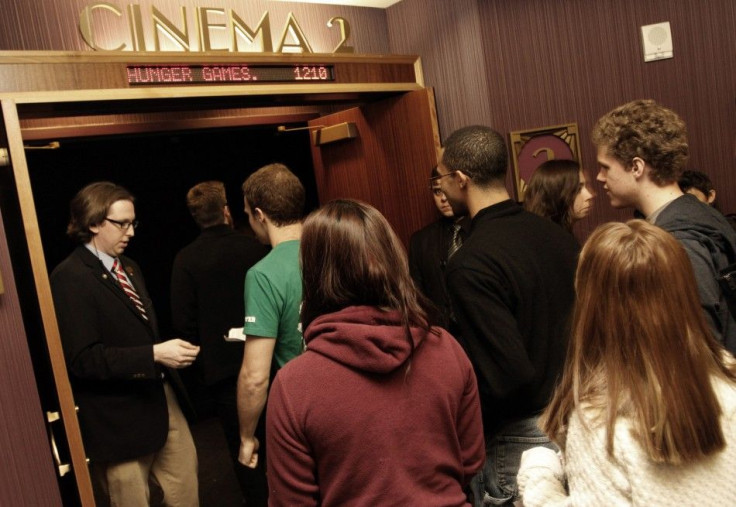Down In Front: Why I Dread And Loathe Going To The Cinema

Like most people around the world, I have loved movies all my life. As a child, I enjoyed adventure tales and escapist fantasies about pirates, space explorers, cowboys and wizards; as an adolescent I thrilled to violent films depicting the exciting and dangerous lives of gangsters, police detectives and soldiers at war; as an adult, I moved toward more "sophisticated" cinematic fare with deeper themes concerning the human condition.
I estimate that I have viewed some 5,000 films in my life -- ranging from the sublime to the ridiculous to the appalling. I am by no means a 'movie snob' since I like such offerings as crowd-pleasing Bing Crosby-Bob Hope comedy musicals, as well as the more "intellectual'" works of genius auteurs like De Sica, Bergmann, Kurosawa and Kubrick.
However, now as I enter middle-age -- while I still possess a passion for good cinema -- I simply cannot stand going to the movie theatres of the early 21 century.
When I was a wee lad, going to the "pictures" represented a major event, a "big night out" for me and my family. Back then, theaters were grand and majestic, with billowy curtains in front of the silver screen that opened like an invitation to a fantastic new dreamworld. Not only that, but most people "dressed up" as if they were going to the opera. No one (excluding perhaps errant children) spoke during the movie and I don't recall people eating and drinking during the show either.
The screens were huge and overwhelming, transporting the audience to faraway places or long-ago periods of the past.
But now? Attending the cinema in 2013 has all the charm and appeal of going to a non-descript suburban shopping mall -- because movie theatres have become exactly that: non-descript suburban shopping malls.
Even in "cool," "hip" Manhattan, where I live, most cinemas are bland, sterile multi-plexes, featuring garish lights, no personality and bored teenagers serving up overpriced crappy junk food (which customers happily and greedily gobble up) in the lobby.
If that isn't depressing enough, once one enters the dark cavernous theater, things get worse. Before one can even watch the film they came to enjoy, one has to endure not one, not two, not three, but up to six, seven or even eight lengthy previews of other movies (most of which I would never dream of wasting the time to watch). By that point, one has almost lost the energy to sit through a two-hour movie ... but wait, now there are now even commercials to endure!
These "opening acts" almost kill one's spirit, rendering the viewer bored and emotionally exhausted before the main show even starts.
Another aspect to this modern cinematic experience are my fellow filmgoers -- at least half are overweight and most look like they just climbed out of the sack. Baseball caps, T-shirts and khakis predominate among the men. I can understand the desire for comfort and casualness, but what purpose does a baseball cap serve? Are they going to catch a foul ball inside a cinema?
In Manhattan, there are essentially three types of movies exhibited and three kinds of corresponding audiences they tend to attract -- popular, commercial big budget extravaganzas that bring in hordes of teenagers (who talk, shout, scream and laugh throughout the film); middle-of-the-road films which attract a dull, bourgeois crowd; and "intellectual/art" films that pretentious, pseudo-intellectuals flock to. The latter example (like Angelika downtown) typically features audiences who not only think they're film "experts" and connoisseurs, but have also deluded themselves into believing they are somehow part of the movie industry themselves. (I far prefer the middle example).
Another issue, of course, is the degraded quality of films found these days. For every truly excellent movie that is produced, Hollywood churns out about 100 pieces of crap designed to appeal to a dull-witted audience’s basest instincts. These films, of course, generate big box office revenue and provide Hollywood with little or no incentive to make quality product.
Even some of the so-called “good" films coming out today are basically pieces of left-wing propaganda (I actually don’t mind propaganda as long as it is made with great skill, which most movies are not). And, is it just me, or were film directors and writers far more creative and gifted before the 1980s?
I wonder, however, about the sustainability of cinemas in the face of the onslaught of services like Netflix and the Internet itself. I would much prefer to watch a film in a theater to enjoy the grandeur of it all -- I don’t understand the appeal of viewing films on small Internet and iPad screens.
Then again, if cinemas become increasingly unpleasant to the eyes and ears, I may have no other choice.
© Copyright IBTimes 2024. All rights reserved.





















